|
|
|
Sort Order |
|
|
|
Items / Page
|
|
|
|
|
|
|
| Srl | Item |
| 1 |
ID:
130510
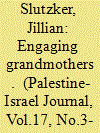

|
|
|
|
|
| Publication |
2011.
|
| Summary/Abstract |
In a small office in the West Bank town of Beit Jallah, just 10 minutes by car from Jerusalem, Tamara Rabinowitz and Siham Abu Awwad sit sipping thick Arabic coffee and finishing each other's sentences. To many in their communities they would seem a very unlikely pair of friends. Tamara, who immigrated to Israel from London in 1960, lost her son Ido in 1987 when he was serving in the Israel Defense Forces in Lebanon. Siham's brother Youssef was shot and killed by an IDF soldier at a checkpoint near their village. Her mother was a Palestinian political activist who served time in Israeli prison, along with three of Siham's brothers.
|
|
|
|
|
|
|
|
|
|
|
|
|
|
|
|
| 2 |
ID:
130505
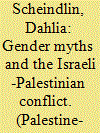

|
|
|
|
|
| Publication |
2011.
|
| Summary/Abstract |
Israeli society has distinct and complex gender roles, and the identities of both men and women are largely derived from militaristic socialization and a wartime mentality. Yet these has not been extensive systemic research comparing the attitudes of men and women toward the Israel-Palestine Conflicts.
|
|
|
|
|
|
|
|
|
|
|
|
|
|
|
|
| 3 |
ID:
130511
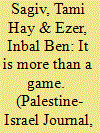

|
|
|
|
|
| Publication |
2011.
|
| Summary/Abstract |
The Sport Department at the Peres Center for Peace. together with its Palestinian partner organization the Al-Quds Association For Democracy and Dialogue, uses football (soccer) to create dialogue between girls and boys from lsrael and the Occupied Territories , enhancing peace-building '-efforts and strengthening their individual and social skills. In this way, young men and women are able to become vocal proponents for peace 'rather than powerless bystanders. The Twinned Peace Sport Schools for _Girls program - - which was established in 2006 after identifying the need for a separate girls' program -- annually bene?ts 100 girls between the 'ges ofnine and I5 from the surrounding Palestinian communities oFBei1 afafa, Beit Sahour. Jericho and Ein Rafa, and the underprivileged (mostly servative and right-wing) lsraeli communities ofKiryat Gat, Merchavim, eruham. liin Karem and Kibbutz Sde Yoav. This unique girls' program if _ s to accommodate religious and cultural considerations on both sides, ttract more girls and women to sports, promote gender equity and create ique opportunity for the participants to get to know "the other side." it project, while being sensitive to cultural needs, is still ditional ideas ofthe role ofgirls and women in society At the Peres Center for Peace, we believe that sports have the capacity Ztranscend factional con?icts and bring disparate groups together. Our s projects cut across pre-existing ties based on Israeli or Palestinian tonality and create new group identity
|
|
|
|
|
|
|
|
|
|
|
|
|
|
|
|
| 4 |
ID:
130508
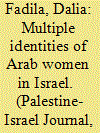

|
|
|
|
|
| Publication |
2011.
|
| Summary/Abstract |
I would like to open with the question: "history" or "her story?" This is the question that has been debated since the 20th century among different groups of women in developed societies. Those women have really moved along the continuum from "history" into "her story," though they are in different stages and are still moving. Yet, women in "developing societies" are not there yet. I would like to preface this with a note on the function of English grammar here. There is nothing developing in "developing" societies. The "ing" is a grammatical technique to perpetuate our static condition. Women in developing societies are still asking the question of whether to write the self, the subject that precedes writing history and which should be the narrative voice. They are still asking the question of why politics, ethnicity, religion, economy, and technology are hindering the writing of the self that ought to be writing history and any narrative of the self and society.
The complexity of holding multiple identities, of being a woman who is Arab, Muslim, a member of a minority and Israeli, must be emphasized. This complexity is a dynamic of clashing variables and it is also the status quo. The clashing variables can be described as follows: Arab contradicts Israeli, Israeli contradicts Muslim, Muslim contradicts women, women are being marginalized by Arabs, Arabs marginalize Israel, Israel marginalizes everybody else and the rest of the world marginalizes all of the above. These clashing variables are going nowhere as they love to clash, which is why they are the status quo. Where does this leave the multi-layered identity of women? In an arena of tension between her own two ambivalent attitudes.
|
|
|
|
|
|
|
|
|
|
|
|
|
|
|
|
| 5 |
ID:
130506


|
|
|
|
|
| Publication |
2011.
|
| Summary/Abstract |
My father is a Bedouin Arab who lived unquestioned on his historical tribal lands until 1948, after which the village was termed "unrecognized" and "illegal." My mother is an Arab Muslim from Nazareth. Even though she comes from one of the strongest Arab cities in northern Israel, she never identifies herself as such, choosing instead to be identified as hailing from her family's uprooted village that existed before 1948. My name is Safa Abu Rabia. I am a Bedouin, an Arab, a Muslim, a Palestinian and also an Israeli. I am all of these things together, but, at the same time, I am none of them.
|
|
|
|
|
|
|
|
|
|
|
|
|
|
|
|
| 6 |
ID:
130512
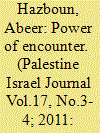

|
|
|
|
|
| Publication |
2011.
|
| Summary/Abstract |
We realized the need for "deeper understanding," allowing students the space and time to talk about culture, identity, their fears and the conflict itself.
How many of us have planned our lives to take a specific direction, only to find ourselves 10 years later in a totally different place? Seven years ago, a friend of mine introduced me to a group of people who were studying abroad and came to Jerusalem wanting to do something about the conflict. One of those people was a student at MIT who had taught computer science in an MIT program in Africa. He thought we might be able to do something similar for Israeli and Palestinian youths. As we all believed in education as a powerful tool to mobilize positive change, during the summer of 2004 we started the Middle East Education for Technology program, or MEET, based in Jerusalem.
|
|
|
|
|
|
|
|
|
|
|
|
|
|
|
|
| 7 |
ID:
130507


|
|
|
|
|
| Publication |
2011.
|
| Summary/Abstract |
It was a note in the Israeli daily Haaretz informing readers that the state attorney's office had asked the police to start an investigation against author and editior Ilana Hammerman which outraged some of us. Hammerman attracted attention when in May 2010 she bravely published a detailed magazine article describing a trip to an Israeli beach in the company of three Palestinian girls.
|
|
|
|
|
|
|
|
|
|
|
|
|
|
|
|
|
|
|
|
|